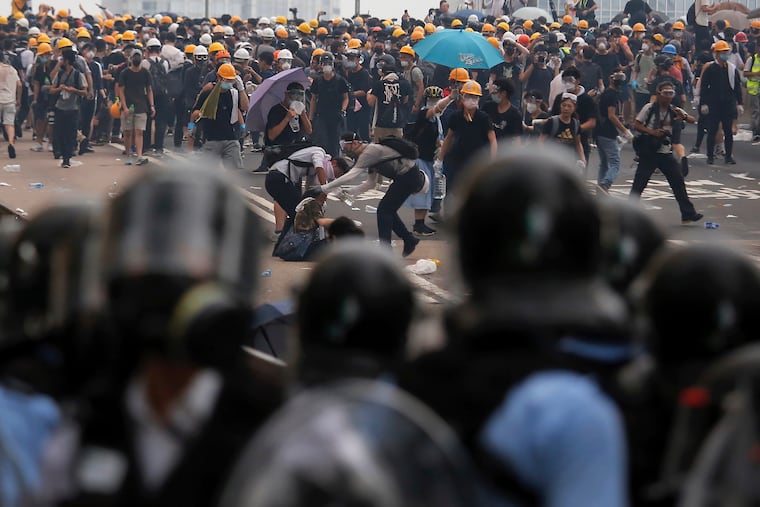Hong Kong democracy protests should inspire Americans | Trudy Rubin
One million Hong Kong residents demonstrate in the streets against Beijing's efforts to curb rule of law in Hong Kong, efforts that ould also endanger U.S. businessmen and journalists.

Those Americans who fear for the future of American democracy should be inspired by the massive pro-democracy demonstrations occurring this week in Hong Kong.
More than one million citizens – 1 out of 7 residents – flooded the downtown Sunday to protest the Hong Kong government’s effort to push through a bill permitting extraditions from Hong Kong to mainland China. It was the biggest protest since similar numbers flooded Hong Kong streets in support of the student revolt that was crushed in Tiananmen Square 30 years ago.
And the current protests, with police attacking demonstrators, will continue if the Hong Kong government insists on pushing this bill through.
No wonder. This extradition plan would gut the deal by which Britain returned its Hong Kong colony to China in 1997. That pact guaranteed that for 50 years Hong Kong would have a high degree of autonomy, under a plan known as “one country, two systems.” In effect, Hong Kong could maintain its own independent legal system, freedom of assembly, and free speech – all in stark contrast to China.
The pending bill would effectively allow Hong Kong dissidents, journalists, or anyone who displeased Beijing to be sent for trial in China on trumped-up charges (with Hong Kong judges under Beijing pressure to approve the transfer). And that, say demonstrators, means the death of Hong Kong.
“Rule of law … is the thing you cannot go without for Hong Kong to survive,” said the dean of the territory’s democracy activists, prominent lawyer Martin Lee, on a visit to the United States last month.
What is so inspiring about the Hong Kong protests is the outpouring of ordinary people, families, the elderly, rich and poor, in an effort to protect the rule of law – a concept we Americans take for granted. The demonstrators persist even though they face an overpowering Beijing regime determined to shrink Hong Kong’s freedoms.
Yet they will not give up. Says Human Rights Watch Hong Kong expert Minky Worden: “The Hong Kong people have a full understanding of what is at stake.”
Hong Kong’s rule of law has been under threat for many years, a threat that has intensified under Chinese leader Xi Jinping.
Consider this: In 2016, I met with 20-year-old democracy activist Joshua Wong, who as a young high school student was a key leader of the 2014 Umbrella Revolution, where young people occupied the streets for 79 days to protest China’s refusal to allow fully free elections for chief executive of Hong Kong. Ultimately, the protests failed – and Wong is now serving a belated jail term imposed for his activities in 2014.
However, I also met with 24-year-old Nathan Law, who, with other young activists, turned to electoral politics after the Umbrella Revolution failed. These Hong Kong crusaders – including Law and five other activists under 40 – won seats to Hong Kong’s Legislative Council. Pro-democracy forces gained sufficient seats in 2016 to block Beijing’s manipulations.
Since then, however, six young opposition lawmakers, including Law, have been disqualified under Beijing’s pressure – supposedly because they failed to take their oaths of office properly.
Law told me then he knew what he was up against. But, he said: “You continue not because you see the hope but so that you can see the hope. I am not blindly optimistic. Everything we do gains a little bit for the future. I am not afraid of being defeated as long as we have the courage to continue the war.”
If that isn’t inspiration for those who sometimes lose heart at democracy’s difficulties in America, I don’t know what would be.
Certainly it is reason for Congress to speak out against the attack on the rule of law in Hong Kong. And for Secretary of State Mike Pompeo to say publicly what he said through a spokesperson last month about the extradition bill and its threat to Hong Kong’s legal system.
Even apart from the moral imperative to speak out, Pompeo surely knows there are practical reasons for Washington to be concerned.
If the trade war between China and the United States worsens, the Hong Kong extradition dragnet could sweep up a U.S. businessman (or academic or journalist) as a hostage. Think of the three Canadians being detained in China in an apparent effort to pressure Canada not to extradite a Huawei executive to the United States.
This threat – of possible rendition of international business executives residing in or transiting through Hong Kong -- is why the American Chamber of Commerce warned that a new extradition agreement would damage the city’s reputation as a “security haven for international business.” It will surely endanger Hong Kong’s value as a major economic asset for China and a safe base for Americans doing business with China.
And it will further threaten those brave Hong Kong democracy activists who have refused, against all odds, to give up their fight.